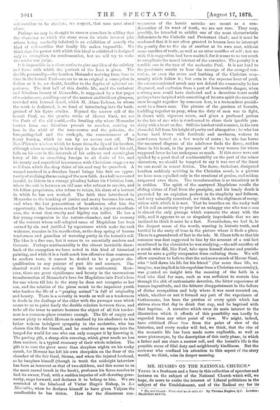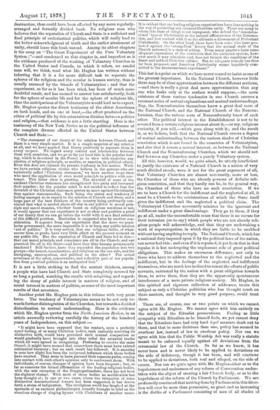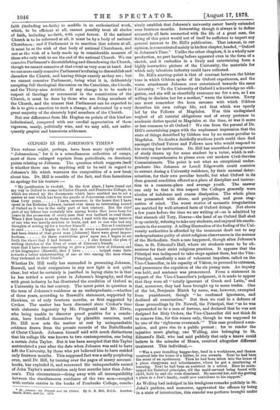MR. HUGHES ON THE NATIONAL CHURCH.* THERE. is a freshness
and a force in this collection of speeches and lectures on the subject of the National Church which will, we hope, do more to excite the interest of Liberal politicians in the subject of the Establishment, and of the Radical cry for its candlesticks he has stolen. Row far the disastrous con- maemillan and Co. Thomas Hughes, Q.C. London:
The Old : Wh Churchat shall w it? By do with i By
destruction, than could have been effected by any more regularly- arranged and formally divided book. No religious man who believes that the separation of Church and State is a sufficient. and final principle of ecclesiastical politics, which will really lead to the better acknowledgment of truth and the earlier attainment of unity, should leave this book unread. Among its ablest chapters is the essay on "The Great Experiment of the Pure Voluntary System ;"—and condensed as that chapter is, and imperfect as is the evidence produced of the working of Voluntary Churches in the United States and Canada, to which it refers, no candid man will, we think, read what Mr. Hughes has written without inferring that it is a far more difficult task to separate the spheres of the religious and the secular in human society, than is usually assumed by the friends of Voluntaryism ; and that the experiment, so far as it has been tried, has been of much more doubtful result, and has seemed to answer less satisfactorily, both for the sphere of secular life and for the sphere of religious life, than the anticipations of the Voluntaryists would lead us to expect. Mr. Hughes quotes the direct testimony of the ablest Americans on both heads, and on one at least,—the effect produced on the ethics of political life by this ostentatious division between politics and religion,—that evidence is not a little startling. Here is the testimony of the New York Nation as to the political influence of the complete divorce effected in the United States between Church and State :— "The statement of our theory of the relation between Church and State is a very simple matter. It is a simple negation of any relation at all, and we have applied that theory positively to separate them in every respect. We regard every contact and relationship between them with suspicion, and we go so far (at least this is the popular feel- ing, -which is re-echoed in the Press) as to view with suspicion any citation of religions principle, or motive, or sanction, in political affairs. Even this does not exhaust the present tendency in this matter. While we have certain religious circles who believe in the persons who are technically called 'Christian statesmen,' we have another large class who meet the application of even moral principle to politics with con- tempt. This latter class is growing. The downfall of some of the eminent Christian statesmen has strengthened this party and increased their number ; for the popular mind is not careful to reflect that the downfall of the Christian statesmen proves no more against Christianity than against statesmanship. Such being the status and tendency of feeling amongst us in regard to the relation of Church and State, and a large part of the best thinkers of the country being profoundly con- vinced that what is needed above all else in our politics is moral prin- ciple and moral stamina, whether based on religious sanctions or not, it would appear that oar experience is not so clear and positive a proof of our theory that we can go before the world with it as a final solution of this difficult problem. Hesitation is suggested also by another con- sideration. It appears from our experience that the more we popu- larise government, the more impossible it is to keep any public interest out of politics.' It is very certain that our religious faiths, of what- soever form or grade, have very little effect at the present moment on our public life. Has the separation of Church and State led to this— that our moral principle and conscience are all in the Church, and our practical life all in the State—and have they thus become permanently sundered ? Still further, have they separated the population into two groups—the honest, conscientious, and religious on the one side, and the intriguing, unscrupulous, and political on the other ? The actual severance of the sober, conservative, and reflective part of our popula- tion from practical politics is an undisputed fact."
It is not a little striking to find the acutest thinkers, among a people who have had Church and State completely severed for so long a period, watching the results with misgiving, and regard- ing the decay of public interest in matters of religion, and of moral interest in matters of politics, as some of the most important results of that severance.
Another point Mr. Hughes puts in this volume with very great force. The tendency of Voluntaryism seems to be not only to- wards further disintegration of the Churches, but towards a decided disinclination to mutual understanding. Here is the evidence which Mr. Hughes quotes from the North-American Review, in an article avowedly reviewing carefully the history of the hundred years of Independence, on this subject :- "It might have been supposed that the contact, upon a perfectly equal footing, of so many Christian bodies, each zealously asserting its distinctive faith, would have provoked such mutual comparison as would gradually have brought into clear relief the essential truths which all were agreed in recognising. Professing to receive the same Gospel, it might have seemed that somewhere there must have existed substantial harmony ; but no such result has followed. It is amazing to note how slight has been the reciprocal influence which these bodies have exerted. They seem to have pursued their separate paths, coming into contact with each other's opinions only to controvert them. With individuals, of course, changes of opinion have been frequent ; but, so far as concerns the formal affirmations of the leading religions bodies, with the sole exception of the Congregationalists, there has not been the slightest change. With most of these bodies no modification has been thought of ; in one or two cases, where the relaxation of some distinctive denominational feature has been suggested, it has drawn forth a storm of indignation. The irreligious world has laughed at the spectacle of an eminent philanthropist actually brought to trial on the atrocious charge of singing hymns with Christians of another name. It is evident that our leading religious organisations have done nothing in the way of promoting any external Christian unity. There are many to whom this state of things is not repugnant, who defend the ' denomina- tional ' type of Christianity as the natural efflorescence of the Reforma- tion, and rest content with it as the ultimate achievement of Protestant Christianity. On the other hand, there have been some who have pro- tested against the 'evangelical' heresy that the normal state of the Church universal is a state of schism. From many quarters have come eloquent expressions of the conviction that the sectarian system, how- ever much it may stimulate zeal, does not furnish the conditions of the finest and noblest Chri,tian culture. But no adequate remedy has thus far been proposed, and American Christianity seems hopelessly com- mitted to the denominational experiment."
This last is a point on which we have never ceased to insist as one of the greatest importance. In the National Church, however little there may be of close approximation between the different sections, —and there is really a great deal more approximation than any one who looks only at the surface would suppose,—the mere existence of these various tendencies in one Church ensures a constant series of mutual explanations and mutual understandings. Nay, the Nonconformists themselves know a great deal more of the National Church, and the National Church of the Noncon- formists, than the various sects of Nonconformity know of each other. The political interest in the Establishment is not to be severed from a certain religious interest about it,—or say, religious curiosity, if you will,—which goes along with it ; and the result is, as we believe, both that the National Church covers a degree of mutual understanding between the various shades of Christian conviction which is not found in the countries of Voluntaryism, and also that it covers a mutual interest, as between the National Church and the Nonconforming Churches, which we should not find between any Churches under a purely Voluntary system.
All this, however, would, we quite admit, be utterly insufficient to justify the existence of a National Church in a nation of very much divided creeds, were it not for the great argument of all, that Voluntary Churches are almost necessarily, more or less, the Churches of those who are already persons of definite reli- gious conviction, and that they hardly can be, in the general way, the Churches of those who have no such conviction. If we are to have a Church for the indifferent and the neglected at all, it must be a Church to the ministrations of which the State itself gives the indifferent and the neglected a political claim. The Voluntaryist Churches necessarily minister to the ignorant and indifferent under a great disadvantage. They go to them, if they go at all, under the uncomfortable sense that there is no excuse for their intrusion (so to say) which people who are not already reli- gious people will acknowledge, and that they are undertaking a work of supererogation, in which they are liable to be snubbed without having anything to reply. The National Church, which has a national duty imposed upon it by the political laws of the nation, can never feel this ; and even if it is repulsed, it yet feels that in that repulse it is but undergoing the unpleasant side of great political obligations. This makes an enormous difference, not only to those who have to address themselves to the neglected and the indifferent, but in the feelings of the neglected and indifferent themselves, who are much less inclined to resent the efforts of public servants, entrusted by the nation with a great obligation towards them, to serve them, than they are the apparently spontaneous interference of a mere private religious society. Mr. Hughes, in this spirited and vigorous collection of addresses, treats this subject as only a Christian politician who has thought much on these matters, and thought to very good purpose, could treat them.
There are, of course, one or two points on which we cannot agree with Mr. Hughes. We cannot agree with him entirely on the subject of the Ritualist prosecutions. Feeling as little
sympathy with Ritualism as he himself feels, we yet cannot deny that the Ritualists have had very hard legal measure dealt out to
them, and that in more decisions than one, policy has seemed to
overbear law, instead of law to overbear policy. Nor can we agree with him that the Public Worship Act was really a statute
meant to be enforced equally against all deviations from the ceremonial law of the Church. So far as we know, it has never been and is never likely to be applied to deviations on
the side of deficiency, though it has been, and will continue to be applied to deviations, both real and alleged, on the side of excess. Nor can we quite agree with Mr. Hughes either as to the hopelessness and uselessness of any reform of Convocation under- taken with the object of creating a fair Church body, or as to the hopefulness of the reform of the Church by Parliament. We are
profoundly convinced that nothing done by Parliament in this direc- tion will ever be more than permissive, so great and so increasing is the dislike of a Parliament consisting of men of all shades of faith (including no-faith) to meddle in an ecclesiastical work, which, to be efficient at all, cannot possibly treat all shades of faith, including no-faith, with equal favour. If the national Church is to be reformed at all, it must be by a body of national Churchmen ; and if Parliament is to sanction that reform at all, it must be as the wish of that body of national Churchmen, and not as the wish of a body made up in considerable measure of those who only wish to see the end of the national Church. We can conceive Parliament's disestablishing and disendowing the Church, though we cannot conceive of that event as very near at hand. And we can more easily conceive Parliament's refusing to disestablish and disendow the Church, and leaving things exactly as they are ; but we cannot conceive Parliament, being what it is, deliberately accepting full theological discussion on the Catechism, the Creeds, and the Thirty-nine Articles. If any change is to be made in respect of theology or ceremonial in the constitution of the Church, it must be done by those who are living members of the Church, and the utmost that Parliament can be expected to do is to give a sanction to such a change, if advocated by a very great majority of the sincerely loyal members of the Church.
But our differences from Mr. Hughes on points of this kind are infinitesimal, compared with our cordial appreciation of these vigorous, manly, politically wise, and we may add, not unfre- quently graphic and humorous addresses.
































 Previous page
Previous page